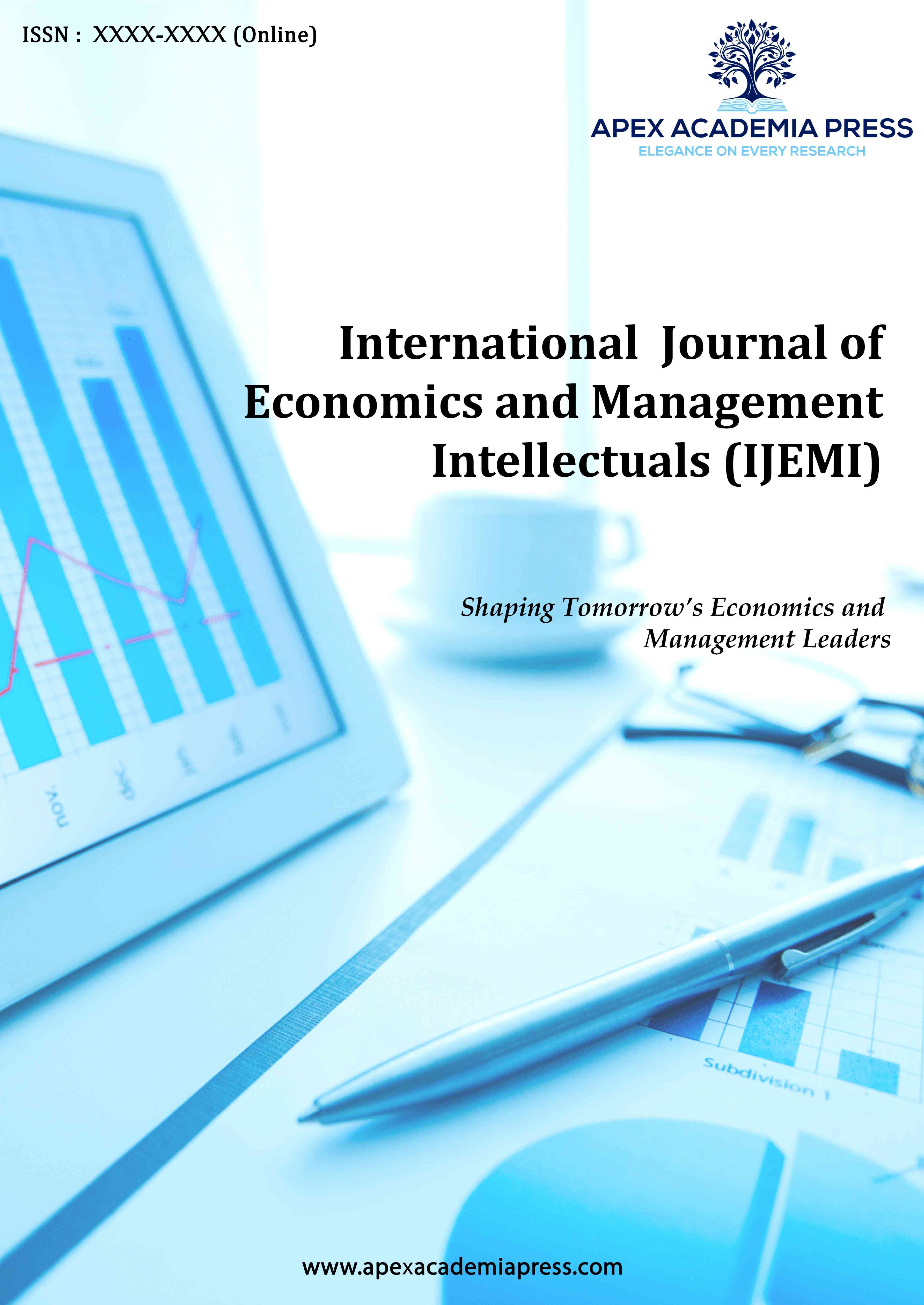International Journal of Economics and Management Intellectuals [IJEMI]
Financial Inclusion and Economic Development
Authors : Md. Ashfaq Rahman
Open Access | Volume 1 Issue 1 | 2024
https://doi.org/10.63665/ijemi_y1f1a002
How to Cite :
Md. Ashfaq Rahman, "Financial Inclusion and Economic Development", International Journal of Economics and Management Intellectuals [IJEMI], 2024, 1(1): pp. 10-18.

Abstract
Financial inclusion is typically regarded as a key driver of economic growth, particularly for the emerging economies. By increasing access to the fundamental financial services of savings, credit, insusrance, and payment for everyone, businesses, and communities, financial inclusion promotes entrepreneurship, employment, and poverty alleviation. This essay considers the definition of financial inclusion and why financial inclusion is important to economic development through the method of identifying mechanisms by which financial services can empower individuals and enterprises. The essay recognizes financial inclusion barriers such as geography, regulatory challenges, and technology limitations, and considers various strategies and policies towards minimizing those limitations. Case studies of developing economies indicate the success of financial inclusion programs, and the paper also makes mention of the linkage of financial inclusion with global agendas such as the United Nations Sustainable Development Goals (SDGs). The paper concludes by discussing the future of financial inclusion in mind, keeping in view the role that new technology will play and the policy reforms that will have to be started to encourage inclusive growth and development even further.
Keywords
Financial Inclusion, Economic Development, Poverty Alleviation, Entrepreneurship, Digital Financial Services, Mobile Banking, Microfinance, Policy Reforms, Sustainable Development Goals (SDGs), Financial Literacy, Economic Empowerment.
Conclusion
A. Summary of Key Findings:
The article highlights the critical role played by financial inclusion in economic development and poverty alleviation, especially for developing economies. It has demonstrated how financial service deepening is able to stimulate individuals to invest in business, enhance their welfare, and drive economic development in general. Additionally, financial inclusion shares synergies with a number of the most important Sustainable Development Goals, including poverty reduction, women's and men's equality, and the conservation of the environment. As much as the advantages are numerous, there exist setbacks such as infrastructure constraints, regulatory challenges, and financial literacy that remain at the center of universal financial inclusion. Financial inclusion in the future relies on the adoption of new technologies and facilitating policies that meet the challenges.
B. Recommendations for Policymakers and Financial Institutions:
The policymakers need to be concerned with developing an enabling regulatory environment that will spur innovation and protect consumers. The financial institutions need to invest in developing digital financial products and services for the under-served markets. Public-private partnerships would have to be needed to increase financial inclusion programs on mass scale, especially where no banking system exists in the majority of regions. Governments must also invest in financial education and digital literacy so that people can make use of financial services. Financial institutions must also offer inclusive business models in the effort to serve low-income and excluded groups.
C. Final Thoughts on the Importance of Integrating Financial Inclusion into Economic Development Strategies:
Overall, financial inclusion in economic development policy is not merely about greater access to financial services but making the world economy more inclusive, sustainable, and equitable. Financial inclusion has the potential to inject entrepreneurship, innovation, and jobs and lift millions out of poverty through the opportunity to access the resources and funds required to contribute actively to the economy. Financial inclusion will be in a position to reach various segments of society and contribute to long-term economic and social stability only if it is incorporated into overall development strategies. In the future, long-term investment in education, technology, and infrastructure will be required in order to reap the full benefits of financial inclusion for global development.
References
- Chandel, M., & Arora, M., Achieving the Sustainable Development Goals through Financial Inclusion: A Bibliometric and Content Analysis. Tourism & Management Studies, 2025, 11(1): pp. 1-20, 2025. https://doi.org/10.18089/tms.20250102
- Chinoda, T., & Kapingura, F.M., Digital Financial Inclusion and Economic Growth in Sub-Saharan Africa: The Role of Institutions and Governance. African Journal of Economic and Management Studies, 2024, 15(1): pp. 15-30, 2024. https://doi.org/10.1108/AJEMS-09-2022-0372
- Iskenderian, M.E., Mary Ellen Iskenderian's Mission to Ensure One Billion Women Have Bank Accounts. Reuters, 2025.
- Khub, A., Saeudy, M., & Gerged, A.M., Digital Financial Inclusion in Emerging Economies: Evidence from Jordan. Journal of Risk and Financial Management, 2024, 17(2): 66, 2024. https://doi.org/10.3390/jrfm17020066
- Lee, L., Enhancing Financial Inclusion and Regulatory Challenges: A Critical Analysis of Digital Banks and Alternative Lenders Through Digital Platforms, Machine Learning, and Large Language Models Integration. arXiv, 2024. https://arxiv.org/abs/2404.11898
- Muschert, G.W., Pereira, V., Ramiah, V., & Doker, A.C., Financial Inclusion: In Pursuit of UN Sustainable Development Goal 8.10. SpringerLink, 2024. https://link.springer.com/book/9783031688027
- Naili, M., Jabbouri, I., & Helmi, I., Financial Inclusion and the Financial and Economic Development: Review of the Literature, Evidence Gaps and the Road Ahead. Qualitative Market Research, 2023, 26(5): pp. 632-662, 2023. https://doi.org/10.1108/QMR-02-2023-0017
- Suri, T., & Jack, W., M-Pesa. Wikipedia, 2025. https://en.wikipedia.org/wiki/M-Pesa
- Zab, S., Nigeria's PalmPay Thrives on 'Ultimate Competition' of Cash. Financial Times, 2025. https://www.ft.com/content/f9b54a77-3565-4c0a-91f1-d78fc63659ae